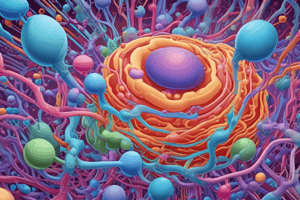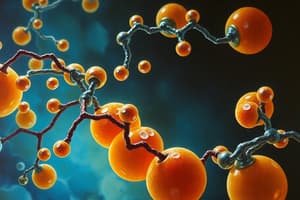Podcast
Questions and Answers
What is the main function of glycoproteins?
What is the main function of glycoproteins?
- To facilitate the movement of molecules across the cell membrane
- To recognize and interact with other cells (correct)
- To synthesize proteins
- To provide energy for cellular processes
What is the main characteristic of peripheral proteins?
What is the main characteristic of peripheral proteins?
- They are permanently attached to the cell membrane
- They are involved in cell signaling
- They are easily removable from the cell membrane (correct)
- They require ATP to function
What type of proteins allow molecules to move through the cell membrane without using energy?
What type of proteins allow molecules to move through the cell membrane without using energy?
- Channel proteins (correct)
- Lipid-bound proteins
- Integral proteins
- Carrier proteins
What is the primary function of carrier proteins?
What is the primary function of carrier proteins?
What type of protein is stuck inside the cell and is really tough to remove?
What type of protein is stuck inside the cell and is really tough to remove?
What is the composition of glycoproteins?
What is the composition of glycoproteins?
What is the approximate percentage of protein in most cell membranes?
What is the approximate percentage of protein in most cell membranes?
What is the main component of a cell membrane?
What is the main component of a cell membrane?
What is the term for proteins that are embedded throughout the cell membrane?
What is the term for proteins that are embedded throughout the cell membrane?
Where are peripheral proteins typically located?
Where are peripheral proteins typically located?
Why are integral proteins difficult to remove from the cell membrane?
Why are integral proteins difficult to remove from the cell membrane?
What is the name of the structure formed by phospholipids in the cell membrane?
What is the name of the structure formed by phospholipids in the cell membrane?
What is the function of proteins in the cell membrane?
What is the function of proteins in the cell membrane?
What is unique about the location of integral proteins compared to peripheral proteins?
What is unique about the location of integral proteins compared to peripheral proteins?
What is the main function of a channel protein?
What is the main function of a channel protein?
Why are lipid-bound proteins rare?
Why are lipid-bound proteins rare?
What is unique about carrier proteins compared to channel proteins?
What is unique about carrier proteins compared to channel proteins?
What is the purpose of peripheral proteins?
What is the purpose of peripheral proteins?
What is the role of glycoproteins?
What is the role of glycoproteins?
Why do channel proteins not require energy to function?
Why do channel proteins not require energy to function?
What is the term for the movement of substances from an area of high concentration to an area of low concentration?
What is the term for the movement of substances from an area of high concentration to an area of low concentration?
What is the function of a lipid-bound protein?
What is the function of a lipid-bound protein?
What is the prefix 'glyco' derived from?
What is the prefix 'glyco' derived from?
What is the main difference between channel proteins and carrier proteins?
What is the main difference between channel proteins and carrier proteins?
Flashcards are hidden until you start studying
Study Notes
Cell Membrane Composition
- The cell membrane can be composed of up to 75% protein, with most cell membranes having around 50% or less protein.
Phospholipids and Lipid Bilayer
- Phospholipids are the building blocks of the cell membrane.
- These phospholipids come together to form a lipid bilayer, which makes up the cell membrane.
- The lipid bilayer is composed of two layers of phospholipids.
Types of Proteins in the Cell Membrane
- There are two major types of proteins in the cell membrane: integral proteins and peripheral proteins.
Integral Proteins
- Integral proteins are embedded throughout the entire cell membrane.
- They are difficult to remove from the cell membrane.
- Examples of integral proteins include channel proteins and carrier proteins.
Peripheral Proteins
- Peripheral proteins are located on the outside of the cell membrane.
- They can attach and remove themselves from the cell membrane or other proteins.
- Peripheral proteins are involved in different cell processes.
Lipid-Bound Proteins
- Lipid-bound proteins are rare and located inside the cell membrane.
- They are stuck on the interior of the cell membrane and can interact with the inside of the cell.
Channel Proteins
- Channel proteins are a type of integral protein.
- They have a hole or channel through them that allows substances to pass through the cell membrane.
- They do not require energy (ATP) to function.
- Channel proteins work with the concentration gradient, allowing substances to move from high to low concentration areas.
Carrier Proteins
- Carrier proteins are also a type of integral protein.
- They carry substances into the cell, protecting them as they enter.
- They can also work in reverse, carrying substances out of the cell.
- Carrier proteins can work against the concentration gradient, requiring energy (ATP) to function.
Glycoproteins
- Glycoproteins are proteins with a chain of sugars attached.
- They can be found on integral proteins, peripheral proteins, or channel proteins.
- Glycoproteins are involved in signaling, allowing cells to recognize each other.
Studying That Suits You
Use AI to generate personalized quizzes and flashcards to suit your learning preferences.




